Saturday, September 30, 2006
Morocco and the impact of mass tourism
Recently The View from Fez looked at the downside of mass tourism. In an opinion piece, (Not in My Back Yard) our Special Affairs Editor, Helen Ranger, mused about the changing face of Marrakech and asked if the same thing was going to happen across the country. It was a timely question. By 2011, low cost airline Ryanair plans to begin a total of 20 routes to Morocco, shuttling a million passengers a year in and out of the country.
As Helen Ranger suggested, the impact of mass tourism, for all its downside, is an ethically vexed question. An influx of tourist dollars or euros is very welcome in a country where over 20% of the urban population is unemployed - a greater number underemployed. The World Bank places the average yearly salary at around $1,740, less than twice what an average tourist spends in four days.
But the upside is real estate. The property developers sense a golden opportunity and one they are not going to let slip. The tourism authorities report that over fifty hotels and some thirty golf courses are at various stages of construction. In the old Medina of Fez there are said to be 120 houses being renovated simply to turn them into guest houses.
A recent edition of the New York Times pointed out that the tourist authorities in Morocco are, naturally, happy with the direction things are going: The government has also begun a $58 million advertising campaign, packaging Morocco as an exotic-yet-safe destination for Europeans: cheap, warm and steeped in tradition — along the lines of how Mexico is perceived in the United States. The spin: hear the calls to prayer, haggle over a tea set and then unwind at the beach. Or forget the medina altogether and just play golf.
The New York Times article pointed out that not everyone is as enthusiastic about the coming tourist blitz.
The country’s Islamist party frequently rails against hotel casinos, restaurants that serve alcohol and the growing gay club scene, according to Ignacio Cembrero, a Rabat-based correspondent for El País, the Spanish newspaper. And even the typically tolerant majority of Moroccans may become fed up if they see too many men without shirts. A rooftop pool, for instance, can be especially problematic.
“You have women swimming in bikinis or topless sunbathing,” said M’hammad Benaboud, director of the history department at the University of Téetouan. “That scene might be shocking to the woman hanging clothes to dry next door.”
Intellectuals like Mr. Benaboud wonder if it is possible to bolster tourism without turning the decayed architectural gems and virgin coasts into a made-for-tourists stage set.
“We have to take our culture and architecture seriously,” he said. “Can’t we conserve historical houses instead of transforming them into bazaars, hotels or restaurants?”
Frequent travelers like María Teresa Prieto, 50, a Madrid business executive, are also concerned about the future. She shivers at the thought of weekend revelers barreling into historic cities and blithely snapping pictures of elderly men in hooded caftans.
“How do I put this without sounding elitist?” she said as she checked her suitcase in Madrid for a flight to Marrakesh. “Let’s just say that if I’m smoking during Ramadan and someone asks me to put out my cigarette, I do and I apologize. Another type of tourist might not.”
Alonso de la Corte, a 34-year-old exporter, spent his August vacation in Agadir, and he said he hoped the package-tour scene there — complete with darts at the pool, disco nights and buffet dinners — doesn’t foreshadow the changes in store elsewhere.
“My hotel was filled with French families sitting on a lounge chair all day without getting to know the country,” he said on his return to Madrid, sunburned and disappointed by everything but the price: 360 euros for a week’s lodging, half board and flights.
But anyone who thinks Morocco is careering too fast down the highway of mass tourism should speak to Judy Lee, a 33-year-old London lawyer who recently traveled with five friends to Essaouira for a bachelorette party. During the taxi ride from Marrakesh airport, the driver stopped at his family’s house for tea. Naturally, he invited Ms. Lee and her friends to join.
“We felt really bad but we said, ‘No,’ because we didn’t want to prolong it,” she recalled. “We’re girls from the city, and we wanted to get there, but I guess in Morocco things move at their pace, not yours.”
See NYT article here: New York Times.
Tags: Morocco Fes, Maghreb news
British surfers head to Moroccan beaches.
Now that the summer season is over in Britain the surfing diehards are making their way to Morocoo. Each year about this time European surfers gather on the coast from Eassaouira down to Agadir.

One British outfit, the Animal Surf Academy (ASA) is moving out to Morocco to set up winter camp. From 1st November through to April 2007 the ASA will set up between Tamaraght and Tagazoute in its own traditional Moroccan villa located just a stones throw away from world class reefs, points and beach breaks including Boilers, Killers, Panoramas and the world renowned Anka point.
The ASA Morocco trips are open to surfers of any ability from well experienced surfers who just want to surf the best breaks in Morocco to beginners wanting to experience the surf in foreign waters. Surf everyday accompanied by the ASA surf guides and get surf tuition with BSA approved instructors if you need it. The ASA is the only company in Morocco that runs a qualified British Surf Association school with fully qualified life guards.
The ASA will also be running rider camp weeks giving you the chance to surf with Animal pro team riders Alan Stokes, Mitch Corbett and Nicola Bunt. Prices start at £255 per person and includes transfers to and from the airport, accommodation, breakfast and a packed lunch every day. Flights aren't included but can be booked cheaply in advance. For further information contact the ASA crew at www.animalsurfacademy.com
Tags: Morocco Fes, Maghreb news

One British outfit, the Animal Surf Academy (ASA) is moving out to Morocco to set up winter camp. From 1st November through to April 2007 the ASA will set up between Tamaraght and Tagazoute in its own traditional Moroccan villa located just a stones throw away from world class reefs, points and beach breaks including Boilers, Killers, Panoramas and the world renowned Anka point.
The ASA Morocco trips are open to surfers of any ability from well experienced surfers who just want to surf the best breaks in Morocco to beginners wanting to experience the surf in foreign waters. Surf everyday accompanied by the ASA surf guides and get surf tuition with BSA approved instructors if you need it. The ASA is the only company in Morocco that runs a qualified British Surf Association school with fully qualified life guards.
The ASA will also be running rider camp weeks giving you the chance to surf with Animal pro team riders Alan Stokes, Mitch Corbett and Nicola Bunt. Prices start at £255 per person and includes transfers to and from the airport, accommodation, breakfast and a packed lunch every day. Flights aren't included but can be booked cheaply in advance. For further information contact the ASA crew at www.animalsurfacademy.com
Tags: Morocco Fes, Maghreb news
Friday, September 29, 2006
Morocco - a top last minute destination
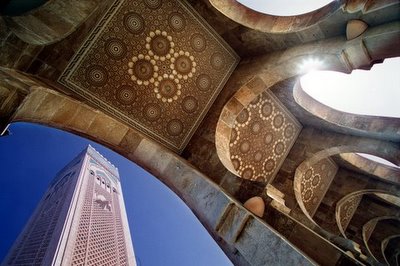
Morocco's image as a tourist destination is undergoing a remarkable change. Only a few years ago it was considered a difficult location for all but the more adventurous traveler. Since the tourist authorities began working on cleaning up problems such as faux guides and petty crime, Morocco has not only become a mainstream destination, but also become the fastest growing destination for holidaymakers who buy flights at the last minute from internet sites.
The impact of cheap airfares and increased competition has also made Morocco an attractive choice. Maghreb Arabe Presse reports that during the summer of 2006, flight bookings to Marrakech leapt 295% year-on-year, maintained by the increased number of flights operating between UK and Morocco. According to the UK based Times Online airlines have been engaged in an aggressive competition because of the record number of flights, with London-Marrakesh fares dropping to as low as 38 euros ($48) return including taxes and charges.
Until July this year two airline groups enjoyed a monopoly over flights between the UK and Morocco British Airways and Royal Air Maroc, with fares averaging more than 200 euros ($252) return but as we have been reporting in the last few months - all that has changed.
According to figures from the French website lastminute.com, Morocco features twice in the top ten flights sold this summer - Marrakech is at #2 and Casablanca at #8. The other popular Moroccan destination is Tangier, which is the fifth fastest growing destination with bookings of up to 132% year-on-year. With new Ryanair flights into Fez starting in late October, the country's most famous Medina can also expect an upsurge of tourists. Ryanair, will launch flights seven weekly flights will link Oujda in northeastern Morocco with Marseille, while three will fly out of the central city of Fes.
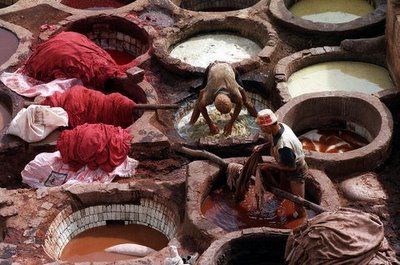
Links are also planned between Morocco and Frankfurt and London in the autumn, with tickets for Oujda to Marseille selling for EUR 23.99 one-way. Morocco is now linked with Croatia and Serbia, into the common European aviation zone.
In May Ryanair signed a five-year agreement with the government of Morocco to develop low-cost air access and tourism to the country from Ryanair's bases throughout Europe.
The profile of tourists is also likely to change. As The View from Fez reported recently, British citizens topped the list of tourists visiting Morocco with 40% of visitors followed by Italians (+15%), Belgians (+13%), Spaniards (+11%), and Germans (+8%). (See our story - Who is visiting Morocco?)

What is puzzling about the figures is that the French numbers are not included. Yet French holidaymakers are in the country in droves amd have a history of travel to Morocco owing to its proximity to France and the absence of language barrier.
Tourist Office pushes into Europe.
The Moroccan National office of Tourism is working hard at promoting the country with major campaigns in Austria and Holland. Sept 27 to Nov 10 in Vienna will see a public exhibition to promote Morocco's tourist and cultural assets, while a Moroccan-Dutch cultural week will be organised in Amsterdam on Oct. 4-8 at the initiative of Fez's regional council of Tourism.
Entitled “The médina of Fez, a Universal Heritage”, this event will be devoted to the development of the intercultural and inter-religious dialogue.
Organised by Amsterdam's Royal KIT museum, in partnership with the district councils of both Fès and Amsterdam, this week will be an occasion to promote the Moroccan culture, especially that of Fez, in the Netherlands.
Besides a rich and varied artistic animation and workshops of Moroccan craft and culinary arts, the programme the features debates on such topics as “Islam and the West”, “Tolerance”, “Arab-Andalusian music” and “Sufi Music”.
It also includes conferences on the economic relations between Morocco and the Netherlands and women's participation in Morocco's political life.
Tags: Morocco Fes, Maghreb news
Buying property in Morocco - A British view
Paul Staines, a partner in one of the UK’s leading Moroccan property specialists, has an interesting and upbeat perspective on the Moroccan market.
Early investors in Morocco’s property market are seeing the value of their homes continue to rise steadily, reports
Popular with UK buyers are the villas and apartments in the new resorts taking shape on Morocco’s Mediterranean coast - a short hop from Spain - as well as others down the Atlantic coast from Tangier to Casablanca and beyond.
First-time buyers - some of them unable to afford a property in the UK - are among those feeling the benefit of getting in early, with the value of their investments growing before their eyes, says Paul.
“Typically, a buyer who paid £40,000 for a two-bedroom apartment near Tangier six months ago, now owns a property worth around £65,000 and its value will keep rising,” he says.
Prices in Morocco are substantially lower than those for comparable properties in Southern Spain, despite the fact that they both overlook the Mediterranean, say Jim and Antoinette Orr of Hainault, Essex, who have bought two properties in the golf and marina resort Mediterrania-Saidia.
The couple, who paid £198,000 for a 253 sq metre four-bedroom villa and £72,000 for a two-bedroom penthouse apartment, expect to be in a position to sell their apartment and use the profit to pay off the mortgage on the villa within four or five years.
“In the eight months since we bought the apartment off-plan, its value has already increased by more than £20,000,” reports Jim whose example is being followed by growing numbers of buyers anxious to secure a property before prices rise out of their reach.
“Enquiry levels have been boosted by the new availability of low-cost direct flights to Morocco from firms like easyJet and Ryanair,” says Paul. “That is why the traditional slowdown in activity during the summer months has been much less than we expected.”
In contrast to the resorts taking shape on the coast, new developments in the Marrakech area are attracting buyers at the top end of the market, seeking exclusivity on smaller luxury developments.
While British buyers remain in the vanguard of overseas investors, they have been joined by others from European counties like Spain, Germany, Belgium, Norway and Sweden, as well as purchasers from further afield. Recently Saffron Villas has started selling Moroccan properties to buyers from the USA, Hawaii, Singapore, Dubai and Bahrain.
Tags: Morocco Fes, Maghreb news
Early investors in Morocco’s property market are seeing the value of their homes continue to rise steadily, reports
Popular with UK buyers are the villas and apartments in the new resorts taking shape on Morocco’s Mediterranean coast - a short hop from Spain - as well as others down the Atlantic coast from Tangier to Casablanca and beyond.
First-time buyers - some of them unable to afford a property in the UK - are among those feeling the benefit of getting in early, with the value of their investments growing before their eyes, says Paul.
“Typically, a buyer who paid £40,000 for a two-bedroom apartment near Tangier six months ago, now owns a property worth around £65,000 and its value will keep rising,” he says.
Prices in Morocco are substantially lower than those for comparable properties in Southern Spain, despite the fact that they both overlook the Mediterranean, say Jim and Antoinette Orr of Hainault, Essex, who have bought two properties in the golf and marina resort Mediterrania-Saidia.
The couple, who paid £198,000 for a 253 sq metre four-bedroom villa and £72,000 for a two-bedroom penthouse apartment, expect to be in a position to sell their apartment and use the profit to pay off the mortgage on the villa within four or five years.
“In the eight months since we bought the apartment off-plan, its value has already increased by more than £20,000,” reports Jim whose example is being followed by growing numbers of buyers anxious to secure a property before prices rise out of their reach.
“Enquiry levels have been boosted by the new availability of low-cost direct flights to Morocco from firms like easyJet and Ryanair,” says Paul. “That is why the traditional slowdown in activity during the summer months has been much less than we expected.”
In contrast to the resorts taking shape on the coast, new developments in the Marrakech area are attracting buyers at the top end of the market, seeking exclusivity on smaller luxury developments.
While British buyers remain in the vanguard of overseas investors, they have been joined by others from European counties like Spain, Germany, Belgium, Norway and Sweden, as well as purchasers from further afield. Recently Saffron Villas has started selling Moroccan properties to buyers from the USA, Hawaii, Singapore, Dubai and Bahrain.
Tags: Morocco Fes, Maghreb news
Most viewed posts - September 2006

Each month we track the most popular posts so that we can get an idea of what you like to read about. Here are the top posts from September.

And our pick of the blogs this month is from our great favourite - the Cat in Rabat Muessin compels me to cheat!
All photos copyright: Suzanna Clarke 2006
Tags: Morocco Fes, Maghreb news
Thursday, September 28, 2006
More cheap flights to Morocco

The increase in cheap flights to Morocco continues with the leading low-fare carrier, Ryanair, offering three flights a week from Barcelona to Marrakech from March 27.
According to a company press release, this new airline is part of the company's USD 280Mn investment plan to consolidate its presence at the international market from Barcelona airport.
Besides Marrakech, 16 new routes will be launched from Barcelona airport towards Northern Europe, Italy, United Kingdom and Canary Islands.
Through this project, Ryanair aims at bringing the number of its passengers to 4 million per year from Barcelona airport.
The Irish company carried some 4 million passengers in August.
Tags: Morocco Fes, Maghreb news
Wednesday, September 27, 2006
New Islamist group uncovered in Morocco
According to local reports and the Al-Jazeera Arab news website, Moroccan security forces have arrested thirteen people, accused of being members of the Islamic Liberation Party. The View from Fez understands that the arrests took place in Casablanca, Tetuan, and Meknes. If confirmed it will be the first official recognition of the existence of an organisation called the Moroccan Islamic Liberation Party in the country.
This political party is unauthorised in Morocco and believed to be linked to a party of the same name founded in the Middle East in the 1950's and gaining popularity in Central Asia during the last decade. It defines itself as a political party, seeks to restore the Islamic caliphate by removing the current Arab regimes and introducing sharia law.
Tags: Morocco Fes, Maghreb news
This political party is unauthorised in Morocco and believed to be linked to a party of the same name founded in the Middle East in the 1950's and gaining popularity in Central Asia during the last decade. It defines itself as a political party, seeks to restore the Islamic caliphate by removing the current Arab regimes and introducing sharia law.
Tags: Morocco Fes, Maghreb news
The Ramadan kitchen
Morocco - Arts and Culture update
Tahar Ben Jelloun wins Italian prize.
Between September 21st to October 14th, Rome holds the between peoples "Lazio Between Europe and the Mediterranean" cultural festival. The special prize for peace and friendship at the festival has been awarded to Moroccan writer Tahar Ben Jelloun and former Egyptian Culture Minister Farouk Hosni.

Tahar Ben Jelloun
The event is intended to foster and promote intercultural dialogue in the Mediterranean. It is being attended Mediterranean artists, including Moroccan writer Abdelkrim Khatibi and painters Mohammed Bennani and Mahi Binbine. The festival is organised by the Lazio region in partnership with the Italian Ministry of Foreign Affairs, under the patronage of President Giorgio Napolitano.
San Sebastian Film Festival features Maghreb films
Cinema in Motion is part of a travelling programme that takes films to festivals in Latin America, Europe and Africa. The second edition of the "Cinema in Motion" section of the San Sebastian Film Festival feature Maghreb films including:
Entre parenthèses by Hicham Falah and Mohamed Chrif Tribak from Morocco. The film explores the political and sentimental apprenticeship of the last generation of politicised students in the of the 80s.
Les larmes d’argent, by Mourad Boucif (Morocco-Belgium). The life of a young Moroccon peasant is cut short with his obligatory enlistment for the French army in 1940, when German troops invade Belgium and Holland.
Mascarades by Lyes Salem (France-Algeria). Marrying off a young girl affected by sleeping sickness is a real nightmare for her brother and head of the family.
Films included in the post-production stage are "L'Autre moitié du ciel" by Kalthoum Bornaz (Tunisia), "Ne restent dans l'Oued que ses galets" by Jean-Pierre Lledó (Algeria-France) and "Vivantes" by Saïd Ould-Khelifa (Algeria-France). (Sansebastianfestival.com)
Tags: Morocco Fes, Maghreb news
Between September 21st to October 14th, Rome holds the between peoples "Lazio Between Europe and the Mediterranean" cultural festival. The special prize for peace and friendship at the festival has been awarded to Moroccan writer Tahar Ben Jelloun and former Egyptian Culture Minister Farouk Hosni.

The event is intended to foster and promote intercultural dialogue in the Mediterranean. It is being attended Mediterranean artists, including Moroccan writer Abdelkrim Khatibi and painters Mohammed Bennani and Mahi Binbine. The festival is organised by the Lazio region in partnership with the Italian Ministry of Foreign Affairs, under the patronage of President Giorgio Napolitano.
San Sebastian Film Festival features Maghreb films
Cinema in Motion is part of a travelling programme that takes films to festivals in Latin America, Europe and Africa. The second edition of the "Cinema in Motion" section of the San Sebastian Film Festival feature Maghreb films including:
Entre parenthèses by Hicham Falah and Mohamed Chrif Tribak from Morocco. The film explores the political and sentimental apprenticeship of the last generation of politicised students in the of the 80s.
Les larmes d’argent, by Mourad Boucif (Morocco-Belgium). The life of a young Moroccon peasant is cut short with his obligatory enlistment for the French army in 1940, when German troops invade Belgium and Holland.
Mascarades by Lyes Salem (France-Algeria). Marrying off a young girl affected by sleeping sickness is a real nightmare for her brother and head of the family.
Films included in the post-production stage are "L'Autre moitié du ciel" by Kalthoum Bornaz (Tunisia), "Ne restent dans l'Oued que ses galets" by Jean-Pierre Lledó (Algeria-France) and "Vivantes" by Saïd Ould-Khelifa (Algeria-France). (Sansebastianfestival.com)
Tags: Morocco Fes, Maghreb news
Tuesday, September 26, 2006
Morocco number two coolest travel destination
In a follow up to our story on Who is visiting Morocco, we can report that according to a survey by British consultancy Superbrands, Morocco is considered the second most popular place for Brits to visit. New Zealand came out as the top destination, ahead of Morocco, Fiji, Prague, Australia, the Maldives, Amsterdam, Brighton, the Bahamas and Bermuda.
The London News also had New Zealand as "The hottest place to be", saying it was reaping the benefits of a marketing campaign.
Morocco coming in second place will be greeted with appreciation by the tourist authorities in Morocco who have spent a lot of time and effort in changing the image of Morocco as a place to visit. Gone are the old perceptions of the country as a place filled with faux guides and hassling carpet salesmen - instead it is now seen as chic and desirable. The number of Brits purchasing houses in Essaouira, Fez and Marrakech is a further indication of the popularity of the new image.
So, after your holiday in New Zealand, grab an Emirates flight to Casa and take the train to Fez. There is a whole new world waiting to be discovered.
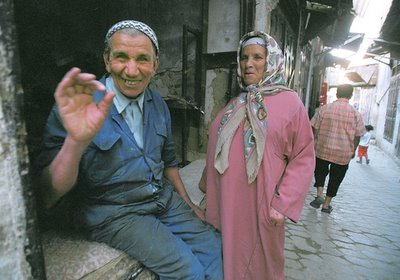
Tags: Morocco Fes, Maghreb news
The London News also had New Zealand as "The hottest place to be", saying it was reaping the benefits of a marketing campaign.
Morocco coming in second place will be greeted with appreciation by the tourist authorities in Morocco who have spent a lot of time and effort in changing the image of Morocco as a place to visit. Gone are the old perceptions of the country as a place filled with faux guides and hassling carpet salesmen - instead it is now seen as chic and desirable. The number of Brits purchasing houses in Essaouira, Fez and Marrakech is a further indication of the popularity of the new image.
So, after your holiday in New Zealand, grab an Emirates flight to Casa and take the train to Fez. There is a whole new world waiting to be discovered.

Tags: Morocco Fes, Maghreb news
What is it with belly dancing?
Here at the View from Fez we occasionally take a look at what is happening outside Morocco - and today we decided to find out why belly dancing and Morocco have become so linked in people's minds.

According to Dental hygenist and belly dancer Llinas, (pictured above) from Stamford in the USA, “The term belly dancing was coined by an event promoter trying to attract attention to a World’s Fair exhibit in 1893,” she said. “The French have a dance called the Ouled Nail that utilizes abdominal control called le danse du ventre, which translates to belly dancing. This is how the promoter came up with the term.”
Others tell a different story. According to another "expert", the correct name for belly dancing is actually "Oriental Dance". The Arabic name for it is raqs sharqi, which means "dance of the East/Orient", and the Turkish name is Oryantal
After the Greek and Roman period, there seems to be no documentation of veil dancing in the Middle East or North Africa in literature or in art. At the end of the 1800's and the beginning of the 1900's, there were numerous photographs taken of women dancing with what looked like shawls and kerchiefs. Many of these photographs were posed pictures which were more reflective of the photographers' prurient taste than the culture which they presumed to document. There was a salacious appetite to be quenched for the English and European buyers of these provocative and sometimes seminude photographs. There was money to be made. The photographs depicted the Orientalists' racist, sexist fantasy of how the forbidden women of the harems were supposed to appear.
These women were clearly exploited. It is most likely that they were very poor women, prostitutes, dancers, and/or slaves. The families of respectable women did not permit them to be photographed. Hence, the people represented in the photographs were not representative of the population at large.
It is difficult and sometimes impossible to discern whether the subjects were posed women, dancing women, or women who were posing in dance postures. Many women were told to take their head scarves or outer modesty coverings off and frame themselves with them. The photographers were exploiting the romanticized and eroticized images of veiled women who uncovered their charms for the onlooker (Artemis Mourat's manuscript, The Illusive Veil.)
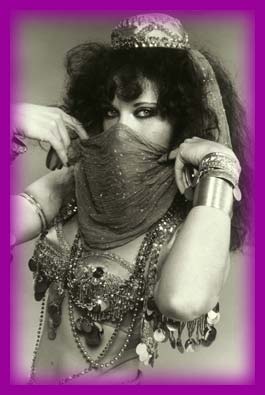
Llinas said that too many people believe the Hollywood portrayal of the young, sexy, perfect-bodied woman gyrating to the melodies of Middle Eastern music. Because they don’t think they look anything like these women, they never consider learning the dances.
“People are intrigued, yet intimidated, by the idea of belly dancing,” Llinas said. “But all the women in my classes are supportive and encouraging. Students range from 13 to 65, and not everyone is thin. These dances are fun, and if a woman is avoiding them because she doesn’t think her stomach is flat enough, she’s making a big mistake.”
The fact that belly dancing was created by Muslim women for each other’s entertainment has been lost.
“The word harem comes from ‘haram,’ which means forbidden,” she said. “This is where men and other immediate family members were not allowed to enter the female quarters of the home, which were separate from the male quarters. When women socialized, they found ways to entertain themselves. One way was by dancing.”
This dance is to Middle Easterners what the waltz is to Americans - so says Llinas.
So where does she perform?
A local French restaurant held a Moroccan theme night and invited Llinas’s troupe to perform.
“I had only taken 10 classes when I was invited to dance with the group,” she said. “The staff wore fez hats and the place was transformed into a Moroccan nightspot. I didn’t know what to wear, so my teacher took a circular tablecloth and turned it into an elasticized-waist skirt. I added the shirt and scarves. We danced among the tables on our tiptoes, slowing down every so often at a table but never stopping.”
So, a word of advice - if you are in Morocco and are invited to a traditional Moroccan belly dance performance - let your appreciation be tempered with a wiff of skepticism about its origins. Then sit back and enjoy.
Tags: Morocco Fes, Maghreb news

According to Dental hygenist and belly dancer Llinas, (pictured above) from Stamford in the USA, “The term belly dancing was coined by an event promoter trying to attract attention to a World’s Fair exhibit in 1893,” she said. “The French have a dance called the Ouled Nail that utilizes abdominal control called le danse du ventre, which translates to belly dancing. This is how the promoter came up with the term.”
Others tell a different story. According to another "expert", the correct name for belly dancing is actually "Oriental Dance". The Arabic name for it is raqs sharqi, which means "dance of the East/Orient", and the Turkish name is Oryantal
After the Greek and Roman period, there seems to be no documentation of veil dancing in the Middle East or North Africa in literature or in art. At the end of the 1800's and the beginning of the 1900's, there were numerous photographs taken of women dancing with what looked like shawls and kerchiefs. Many of these photographs were posed pictures which were more reflective of the photographers' prurient taste than the culture which they presumed to document. There was a salacious appetite to be quenched for the English and European buyers of these provocative and sometimes seminude photographs. There was money to be made. The photographs depicted the Orientalists' racist, sexist fantasy of how the forbidden women of the harems were supposed to appear.
These women were clearly exploited. It is most likely that they were very poor women, prostitutes, dancers, and/or slaves. The families of respectable women did not permit them to be photographed. Hence, the people represented in the photographs were not representative of the population at large.
It is difficult and sometimes impossible to discern whether the subjects were posed women, dancing women, or women who were posing in dance postures. Many women were told to take their head scarves or outer modesty coverings off and frame themselves with them. The photographers were exploiting the romanticized and eroticized images of veiled women who uncovered their charms for the onlooker (Artemis Mourat's manuscript, The Illusive Veil.)

Llinas said that too many people believe the Hollywood portrayal of the young, sexy, perfect-bodied woman gyrating to the melodies of Middle Eastern music. Because they don’t think they look anything like these women, they never consider learning the dances.
“People are intrigued, yet intimidated, by the idea of belly dancing,” Llinas said. “But all the women in my classes are supportive and encouraging. Students range from 13 to 65, and not everyone is thin. These dances are fun, and if a woman is avoiding them because she doesn’t think her stomach is flat enough, she’s making a big mistake.”
The fact that belly dancing was created by Muslim women for each other’s entertainment has been lost.
“The word harem comes from ‘haram,’ which means forbidden,” she said. “This is where men and other immediate family members were not allowed to enter the female quarters of the home, which were separate from the male quarters. When women socialized, they found ways to entertain themselves. One way was by dancing.”
This dance is to Middle Easterners what the waltz is to Americans - so says Llinas.
So where does she perform?
A local French restaurant held a Moroccan theme night and invited Llinas’s troupe to perform.
“I had only taken 10 classes when I was invited to dance with the group,” she said. “The staff wore fez hats and the place was transformed into a Moroccan nightspot. I didn’t know what to wear, so my teacher took a circular tablecloth and turned it into an elasticized-waist skirt. I added the shirt and scarves. We danced among the tables on our tiptoes, slowing down every so often at a table but never stopping.”
So, a word of advice - if you are in Morocco and are invited to a traditional Moroccan belly dance performance - let your appreciation be tempered with a wiff of skepticism about its origins. Then sit back and enjoy.
Tags: Morocco Fes, Maghreb news
Monday, September 25, 2006
1500 jobs to head to Morocco?

Unconfirmed reports claim that the insurance company Axa plans to move 1,500 jobs to Morocco and to double its operating profit as part of the goals it has set for 2012.
A spokesperson of Axa France underlined that Morocco had been chosen, among others, for the flexibility of working hours of Moroccans, compared to the French market.
The insurance group, which will face an important retirement movement in the coming six years, added that it also intends to recruit 1,500 people in France, mainly in its administrative services, and 600 people per year in its sales networks by 2012.
Tags: Morocco Fes, Maghreb news
Who is visiting Morocco?
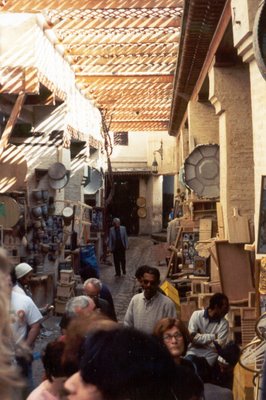
Walk around the Medina of Fez at the moment and you can not help noticing the large numbers of tourists who have chosen Ramadan as a good time to visit. The general impression is that the majority are French nationals, but according to the latest figures it is the British who have topped the list of visitors.
According to figures released by National Tourism Observatory, up to July, overall tourism receipts in hard currency have topped 3.09 billion US dollars. That is an increase of increase of 29% compared to the same period of last year. During this period, the travel receipts and expenses balance totaled a 32% increase, while bed-nights in tourism ranked institutions have registered a 6% growth, with 9,296,661 arrivals.
Guest nights in some major destinations such as Agadir, south (+11%), Marrakech, center (+3%), Casablanca (+11%) and Tangier (+4%) scored an appreciable growth.
British citizens topped the list of tourists visiting Morocco with 40% of visitors followed by Italians (+15%), Belgians (+13%), Spaniards (+11%), and Germans (+8%).
Tags: Morocco Fes, Maghreb news
Morocco to create 5000 micro companies.
There has been some lateral thinking going on in Morocco. Confronted with poor, unemployed and handicapped people who need work and communication technology, the Minister of the Social Development, Family and Solidarity, Aberrahim Harouchi has come up with an innovative plan that addresses both needs.
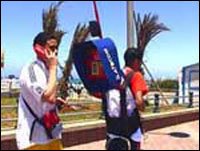
On Saturday in Casablanca he launched the “LiajliCom” (for you) programme which provides for creation of 5,000 small companies providing moving "publiphones" on behalf of people living in precarious situations.
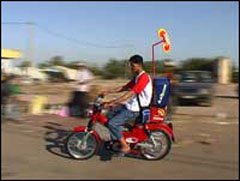
The details are still to be announced, but the idea seems to be to provide mobile, compact public phones - either on motor scooters or maybe even in backpacks - and take them where they are needed.
Resulting from a partnership agreement between the Ministry of Social Development, Telefonica Foundation, Ilaicom company and the General Confederation of Moroccan Companies (CGEM), this programme targets mainly the poorest 403 rural communes and 264 urban districts throughout the kingdom, as identified in the framework of the National Initiative for Human Development (INDH).
According to its promoters, the project, intended to fight exclusion and precariousness, represents a real social integration opportunity for thousands of poor, unemployed, and handicapped people, offering them a low-cost and income-generating production equipment.
It will also make it possible for people to improve their precarious income, underlined Harouchi, indicating that this project is part of the Employment Initiative launched recently by the government and which aims at the creation of 200,000 jobs by 2008.
The minister added that thanks to the GSM technology, these publiphones will allow linking thousands of ‘Douars' by connecting them to basic communication services, thus sparing the time and effort they waste while looking for a means of communication.
The creation of these micro-enterprises constitutes a true encouragement for the personal initiative, which is inline with the philosophy of the INDH, stressed the minister, concluding that from now on the beneficiaries will be able to become actors of their own development through the creation of income-generating activities.
Tags: Morocco Fes, Maghreb news

On Saturday in Casablanca he launched the “LiajliCom” (for you) programme which provides for creation of 5,000 small companies providing moving "publiphones" on behalf of people living in precarious situations.

The details are still to be announced, but the idea seems to be to provide mobile, compact public phones - either on motor scooters or maybe even in backpacks - and take them where they are needed.
Resulting from a partnership agreement between the Ministry of Social Development, Telefonica Foundation, Ilaicom company and the General Confederation of Moroccan Companies (CGEM), this programme targets mainly the poorest 403 rural communes and 264 urban districts throughout the kingdom, as identified in the framework of the National Initiative for Human Development (INDH).
According to its promoters, the project, intended to fight exclusion and precariousness, represents a real social integration opportunity for thousands of poor, unemployed, and handicapped people, offering them a low-cost and income-generating production equipment.
It will also make it possible for people to improve their precarious income, underlined Harouchi, indicating that this project is part of the Employment Initiative launched recently by the government and which aims at the creation of 200,000 jobs by 2008.
The minister added that thanks to the GSM technology, these publiphones will allow linking thousands of ‘Douars' by connecting them to basic communication services, thus sparing the time and effort they waste while looking for a means of communication.
The creation of these micro-enterprises constitutes a true encouragement for the personal initiative, which is inline with the philosophy of the INDH, stressed the minister, concluding that from now on the beneficiaries will be able to become actors of their own development through the creation of income-generating activities.
Tags: Morocco Fes, Maghreb news
Two killed in building collapse in Fez
On the first day of Ramadan comes the sad news that a house has collapsed in Fez. The building off the Tala'a Kbira is believed to have been in the process of renovation. Two people are reported to have been killed - a builder and his workman.
According to our commentator, David "This is very sad news indeed. But just to clarify what happened, these craftsman were restoring a house, Dar Ouazzani on Derb il Horra. They were repairing a roof that had some beams with rotten ends. Some of the beams broke and the craftsmen fell and died. This incident shows the importance of supporting beams from below while during restoration, which I assume didn't happen in this case, and also the importance of having insurance when doing restoration, which I'm afraid most people don't do"
Over the last few years there have been several deaths as a result of building collapses. One, at a mosque, killed twelve and more recently a pregnant woman was killed by a falling wall.
Tags: Morocco Fes, Maghreb news
According to our commentator, David "This is very sad news indeed. But just to clarify what happened, these craftsman were restoring a house, Dar Ouazzani on Derb il Horra. They were repairing a roof that had some beams with rotten ends. Some of the beams broke and the craftsmen fell and died. This incident shows the importance of supporting beams from below while during restoration, which I assume didn't happen in this case, and also the importance of having insurance when doing restoration, which I'm afraid most people don't do"
Over the last few years there have been several deaths as a result of building collapses. One, at a mosque, killed twelve and more recently a pregnant woman was killed by a falling wall.
Tags: Morocco Fes, Maghreb news
Sunday, September 24, 2006
Renovation blogs take off.
A couple of years ago the idea of blogging about your house renovation would have had you labelled as crazy. Now, of course, it is very common. Now the mainstream media is writing stories about bloggers writing stories about their renovations.
The Toronto Star has captured the flavour of these online renovators:
Welcome to the entertaining world of home improvement blogs.
Yes, Ahlen's nemesis is merely his stubborn old house near Atkins, Ark., a Queen Anne Victorian he's dubbed "The Devil Queen" — or on tough days, "the house of pure evil." And he's just one of hundreds of "housebloggers" who swap tales of stripping paint, restoring windows, installing fixtures, varnishing, scraping, caulking, sawing, hammering, shaving and drilling.
As with all worlds brought together by the Internet, it doesn't matter where you are. You can be at your villa in Morocco, commenting on the stain a fellow blogger has chosen for his floor boards in Wisconsin. You can be in your tiny studio in New York City, getting advice from Australia about the backsplash in your kitchen.
And the best thing? "Nobody thinks you're crazy," says Jeannie Olson, author of the "House in Progress" blog and editor of a whole community of blogs. When you buy a rundown house that needs years of renovation, says Olson, "people you know think you're completely insane. You lose your social life."
But in the blogosphere, you have a home.
"This is where you can really vent, find commiseration, find motivation," she says. "And you get such great ideas from people!"
And friendship — virtual, maybe, but also quite real. When Olson and her husband, Aaron, had their first child eight months ago, they posted a delivery-room video of newborn Grace. It was only natural, since readers were well acquainted with their first "baby" — their house in the Albany Park section of Chicago.
And, naturally enough, Morocco gets a mention.
There are now 358 blogs on houseblogs.net. Among them: bloggers from Australia, Estonia, France and even Morocco, where an American family is designing and building a guest house in Marrakech. There's also a guy renovating a former missile base in upstate New York that he bought on eBay.
Mmm... one guy in Marrakech? For several years David Amster's site (House in Fez) has been a font of knowledge for the extreme renovators in Fez and Marrakech. The View from Fez then came along, followed several months later by Fez Restoration Blog and a host of others.
But, good blog or bad blog, the trend seems set to continue. According to the Toronto Star...
You don't need four acres — or even a mortgage — to have a popular houseblog. New Yorker Alex Bandon has about 550 square feet — pretty typical for a one-bedroom rental in the city. But her blog, "The Shelter Life," has had 20,000 visitors since she began it this summer, she says.
The full Toronto Star story here: Bloggers share the pain and pleasure
Tags: Morocco Fes, Maghreb news
The Toronto Star has captured the flavour of these online renovators:
Welcome to the entertaining world of home improvement blogs.
Yes, Ahlen's nemesis is merely his stubborn old house near Atkins, Ark., a Queen Anne Victorian he's dubbed "The Devil Queen" — or on tough days, "the house of pure evil." And he's just one of hundreds of "housebloggers" who swap tales of stripping paint, restoring windows, installing fixtures, varnishing, scraping, caulking, sawing, hammering, shaving and drilling.
As with all worlds brought together by the Internet, it doesn't matter where you are. You can be at your villa in Morocco, commenting on the stain a fellow blogger has chosen for his floor boards in Wisconsin. You can be in your tiny studio in New York City, getting advice from Australia about the backsplash in your kitchen.
And the best thing? "Nobody thinks you're crazy," says Jeannie Olson, author of the "House in Progress" blog and editor of a whole community of blogs. When you buy a rundown house that needs years of renovation, says Olson, "people you know think you're completely insane. You lose your social life."
But in the blogosphere, you have a home.
"This is where you can really vent, find commiseration, find motivation," she says. "And you get such great ideas from people!"
And friendship — virtual, maybe, but also quite real. When Olson and her husband, Aaron, had their first child eight months ago, they posted a delivery-room video of newborn Grace. It was only natural, since readers were well acquainted with their first "baby" — their house in the Albany Park section of Chicago.
And, naturally enough, Morocco gets a mention.
There are now 358 blogs on houseblogs.net. Among them: bloggers from Australia, Estonia, France and even Morocco, where an American family is designing and building a guest house in Marrakech. There's also a guy renovating a former missile base in upstate New York that he bought on eBay.
Mmm... one guy in Marrakech? For several years David Amster's site (House in Fez) has been a font of knowledge for the extreme renovators in Fez and Marrakech. The View from Fez then came along, followed several months later by Fez Restoration Blog and a host of others.
But, good blog or bad blog, the trend seems set to continue. According to the Toronto Star...
You don't need four acres — or even a mortgage — to have a popular houseblog. New Yorker Alex Bandon has about 550 square feet — pretty typical for a one-bedroom rental in the city. But her blog, "The Shelter Life," has had 20,000 visitors since she began it this summer, she says.
The full Toronto Star story here: Bloggers share the pain and pleasure
Tags: Morocco Fes, Maghreb news
Saturday, September 23, 2006
Record house prices in Fez Medina
Dar Tisaa is an average sized dar in the Fez medina that has been renovated tastefully with a micro-mini pool in the courtyard and a great roof terrace view of the medina. The renovations have created three suites, each with private bath. So what is it worth?
Let's talk in Euros and mention that five years ago it sold for 28,000. So we were amazed to hear that this house just sold to a Russian buyer for 300,000 Euros through American agency, Fes Properties. It is an amazing price and no way reflective of the normal Medina prices. It should be remembered that a house in Fez can be bought from 10,000 at the low end with most houses ranging from 20 to 200 thousand. In a recent survey of websites we came up with an average of around 56,000 Euros.
The price of 300,000 does sound on the high side especially as we understand that the owner wants to use the place as a rental property in an already crowded market.
You can check prices for yourself at Immobilier-Maroc.com where the prices quoted are about 50% higher than the price on the street! Nevertheless, the site will give you an idea of the prices.
If you need good advice about buying a house in Fez, contact Adil at Fez Medina Consulting
For restoration advice contact Jon and Jenny at Fezmorocco.com.
NOTE: The View from Fez has no connection or financial interest in any of the services offered. We pass on information only to assist people interested in the Medina of Fez.
Tags: Morocco Fes, Maghreb news
Let's talk in Euros and mention that five years ago it sold for 28,000. So we were amazed to hear that this house just sold to a Russian buyer for 300,000 Euros through American agency, Fes Properties. It is an amazing price and no way reflective of the normal Medina prices. It should be remembered that a house in Fez can be bought from 10,000 at the low end with most houses ranging from 20 to 200 thousand. In a recent survey of websites we came up with an average of around 56,000 Euros.
The price of 300,000 does sound on the high side especially as we understand that the owner wants to use the place as a rental property in an already crowded market.
You can check prices for yourself at Immobilier-Maroc.com where the prices quoted are about 50% higher than the price on the street! Nevertheless, the site will give you an idea of the prices.
If you need good advice about buying a house in Fez, contact Adil at Fez Medina Consulting
For restoration advice contact Jon and Jenny at Fezmorocco.com.
NOTE: The View from Fez has no connection or financial interest in any of the services offered. We pass on information only to assist people interested in the Medina of Fez.
Tags: Morocco Fes, Maghreb news
Morocco and the challenge of Islamisation
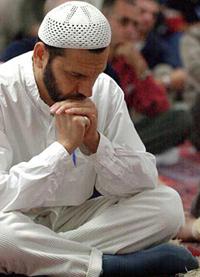
Over the last few years most observers have commented on Morocco's progress towards democracy, gender equity and modernisation. However, from time to time other commentators are less convinced. One such is Olivier Guitta, a foreign affairs and counterterrorism consultant in Washington, D.C. who argues that extremism is displacing moderation in the North African kingdom.
In an article titled The Islamization of Morocco, Olivier Guitta points out that there are other forces at work.
Here is an excerpt, followed by a link to the full article:
A LITTLE MORE THAN three years ago, Morocco experienced Islamic terrorism firsthand. On May 16, 2003, Casablanca was hit with four simultaneous attacks that left 45 people dead and hundreds injured. The attacks were perpetrated by Moroccan citizens who were members of the al Qaeda-affiliated Moroccan Islamic Combatant Group (known by its French acronym, GICM).
Needless to say, the kingdom was stunned that its sons had turned violently against it. Now, the dismantling of another extensive Islamist cell in Morocco confirms that extremism is spreading inside what has long been viewed as one of the most moderate countries in the Arab world.
In a series of arrests over the past month, Moroccan authorities have seized 59 people and over 30 kilograms of TNT, more than was used in the 2003 attacks but of the same type. The alleged targets were political and military leaders, along with locations in Marrakesh, Morocco's premier tourist destination, the air force base of Salé, and the U.S. embassy in Rabat.
But the most troubling aspect of this cell by far is its membership. While the suicide bombers of 2003 came from the slums around Casa blanca, the newly arrested suspects are from all walks of life. They include five members of the military, three policemen, a Domestic Security officer, two imams, and four society women. Two of these women, the wives of Royal Air Morocco pilots, had volunteered for suicide missions in Iraq and Israel.
The cell leader, Hassan Khattab, who had spent two years in prison for his
support for the 2003 terror attacks, had persuaded the women to finance local jihadi attacks because Morocco is the "ally of the Americans and the Zionists." Coincidentally, these four women had befriended Fatiha Hassani, the widow of the top Moroccan al Qaeda operative who was killed by Saudi forces in April 2005. The indictment accuses the cell members of "planning terrorist acts to overthrow the regime and install an Islamic caliphate."
The potential infiltration of the army by jihadists has clearly alarmed the authorities. As of August 31, they have eliminated compulsory military service in order to avoid giving free military training to potential terrorists. In addition, military officers and troops alike have been forbidden to perform Friday prayers in uniform.
The full story is here: The Islamization of Morocco
Tags: Morocco Fes, Maghreb news
Eleven killed in Southern Morocco
Eleven people were killed and 25 injured, including 5 seriously, in a road accident that took place Friday near the southern city of Tiznit.
The accident occurred when a coach overturned in a ravine in the commune of Ait Rkha, 38km of Tiznit.
Road accidents involving coaches claimed the lives of other 17 people and injured 44 in September in the cities of Khémisset and Fqih Ben Saleh.
On August 30, some 17 people were killed and 26 others injured, including 12 seriously, when a coach overturned on the national highway near Settat (157km south of Rabat).
According to local authorities, speed excess and drivers’ inadvertence are to blame for the accidents.
During the last ten years, road accidents increased at a yearly basis of 3pc, causing enormous economic losses. They cost the State about USD 1.2 billion a year, i.e. 2.5% of the GDP.
Tags: Morocco Fes, Maghreb news
The accident occurred when a coach overturned in a ravine in the commune of Ait Rkha, 38km of Tiznit.
Road accidents involving coaches claimed the lives of other 17 people and injured 44 in September in the cities of Khémisset and Fqih Ben Saleh.
On August 30, some 17 people were killed and 26 others injured, including 12 seriously, when a coach overturned on the national highway near Settat (157km south of Rabat).
According to local authorities, speed excess and drivers’ inadvertence are to blame for the accidents.
During the last ten years, road accidents increased at a yearly basis of 3pc, causing enormous economic losses. They cost the State about USD 1.2 billion a year, i.e. 2.5% of the GDP.
Tags: Morocco Fes, Maghreb news
Black Widow - Now available in Polish!
A strange thing happened at The View from Fez today. We recieved hundreds of hits on the blog from people searching for Sandy McCutcheon's novel about the Beslan tragedy. Black Widow was launched earlier this year to critical aclaim and this month was translated and published in Polish. The title in Polish is Czarne Wdowy.
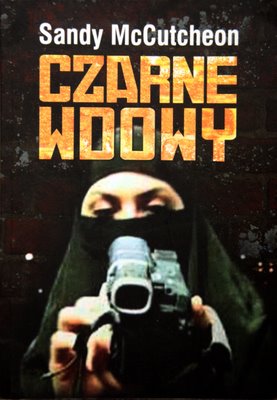
The Polish edition of Black Widow
We still don't know what sparked todays sudden interest - if you know, we would love to hear from you!
For more information on Black Widow and to read the reviews check out our earlier story here: Black Widow
To buy a copy of Black Widow, The Cobbler's Apprenctice, or any of Sandy McCutcheon's other novels go to: Gleebooks Online
POLISH REVIEW (In Polish) MARENO
Tags: Morocco Fes, Maghreb news

We still don't know what sparked todays sudden interest - if you know, we would love to hear from you!
For more information on Black Widow and to read the reviews check out our earlier story here: Black Widow
To buy a copy of Black Widow, The Cobbler's Apprenctice, or any of Sandy McCutcheon's other novels go to: Gleebooks Online
POLISH REVIEW (In Polish) MARENO
Tags: Morocco Fes, Maghreb news
Friday, September 22, 2006
Ramadan for tourists.

Ramadan is about to be observed here in Fez, so we thought it might be useful for visitors to understand what is going on.
Every country in the Islamic world observes the fast of Ramadan. It falls on different dates each year, but in 2006 runs from September 23 October 22. It's important to be aware if you are travelling to a predominantly Muslim country during Ramadan, but it shouldn't put you off visiting.
During the month of Ramadan, Muslims fast during the hours of daylight and eat in the evenings. After the sun sets the fast is broken with a meal known as iftar - a mini feast with plenty of sweets and dates.
Non-Muslims and guests visiting Islamic countries are not expected to observe the fast, but it's polite to respect local customs. Be discrete if consuming food or water during the day, and avoid smoking in public places.
In the more liberal of the Middle East countries such as Egypt, Tunisia and Morocco, Ramadan can pass almost unnoticed by most tourists, although observance effects tourists more in places like the Gulf states, Syria, and Libya. Shops might close earlier than normal, there could be extra restrictions on the sale of alcohol, and many restaurants will close during the day. Also, keep in mind that museums and sights will close early to allow people to return to their homes for iftar.
Ramadan ends with one of the most important Islamic celebrations of the year Eid al-Fitr - Festival of the Breaking of the Fast. During the three-day celebration homes are decorated, people dress in their finest clothes and families meet and enjoy visits from friends.
Tags: Morocco Fes, Maghreb news
Festival of Moulay Idriss
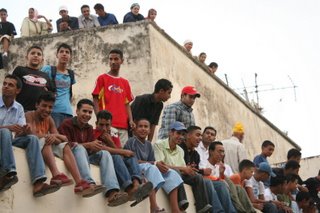
Yesterday the Medina of Fez came to a standstill as tens of thousands of people lined the streets to watch the parade from the Bab Boujeloud to the Mausoleum of Moulay Idriss.

For several hours the crowds were entertained by the amazing music of the many Sufi Brotherhoods


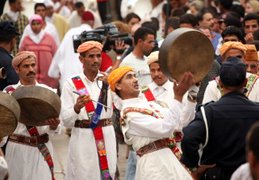


The excitement was too much for one female tourist (pictured above) who danced herself into a frenzy and then began to remove her clothes. Her modesty was quickly restored by the unimpressed locals.
All photographs copyright Suzanna Clarke 2006.
Tags: Morocco Fes, Maghreb news
Thursday, September 21, 2006
Travel writing about Morocco - part four
After reading a lot of very badly written travel stories we have found one worth passing on. We came across it in the online Daily Trojan - the magazine of the University of Southern California. The author, Joe Horton has a thriller writer's sense of pace and style - and a sense of humour. He and his friends have a typical first timer experience in Fez and (thankfully) are wise enough to laugh at their own mistakes.
Here is an excerpt followed by a link to the original story.
I sipped my mint tea and prepared for death.
How do I answer him? I don't speak Arabic. His breath was hot in my ear. He cracked his knuckles.
"I'd like to go now please," I whispered.
The man approached.
And the darkness closed in.
One day earlier, Kate, Tim and I had arrived at the Hotel Batha-Fez on the outskirts of the Medina - a bustling, bazaar-filled enclave in the holiest city in Morocco. Caked with the dust of two continents, we hoped to take a shower but were informed that the hot water was only turned on from 6 p.m. to 10 p.m. daily.
Fine. We'll take a swim in the hotel pool instead. There was a sign on the door, however, and the French translated as such: Think's To Not Use The Napkins In The Pool
Unsure of whether this meant that people were eating or being eaten in the pool area, we elected to fall into a dirty slumber.
We met our "Ministry of Tourism"- approved guide, Tariq, in the lobby at 9 a.m. He looked like a Moroccan Obi-Wan Kenobi, and I couldn't help but think that his robed getup was somehow just a show for the tourists, considering no one else was wearing one.
Tariq didn't waste any time showing us why he was an official guide. He knew ALL of the scams. Apparently, a "guide" means "a guy who shows you around to his friends who will sell you things at outrageous prices." It didn't take us long to realize we'd be better off on our own, and it didn't take us long after that to realize being on our own was a terrible, terrible mistake.
Tariq showed us into a massive rug factory that doubled as an elegant sweatshop. Perhaps sensing our resistance at being scammed, Tariq let us wander in alone. Scarf-covered women popped their heads out of doors before loud, manly voices screamed at them and they ducked back inside. I was sure I'd find "HELP" stitched into a lovely throw rug.
Read the full story here: The Road to Morocco
Tags: Morocco Fes, Maghreb news
Women's rights in Morocco

In the last few years Morocco has taken the lead amongst the Islamic countries in promoting gender equity and the rights of women. Recognition for the nation's positive steps has come from around the world and this week was highlighted in Geneva.
On Wednesday the Moroccan ambassador and Permanent Representative in the UN office in Geneva described the set of women-friendly measures adopted by Morocco to enhance women's situation. Speaking during a debate on "Violence against women: its Causes and Consequences" at the 2nd session of The United Nations Human Rights Council (UNHRC), Mohamed Loulichki, noted that Morocco has adopted a set of women-friendly measures to annihilate all forms of violence against women.
The Government has adopted a specific plan, launched crisis centers for beaten women in all courts, criminalized sexual harassment and endorsed a new family code, he said, adding that eliminating violence against women, securing their participation in all public activities and reinforcing their power will help eradicate previous problems and discrimination.
Much still remains to be done, including questions of literacy rates and the fact that some Moroccan employers still treat young women as lowly paid workers. Recently The View from Fez came across a typical situation where a very talented young woman was being paid for general duties plus translation work at the rate of thirty dirhams a day. This is less than half of what most people pay female workers for unskilled work.
Literacy is important as without it many rural women have no means of reading about their rights. Yet despite this, Morocco is far ahead of many other countries in the region.
Tags: Morocco Fes, Maghreb news
Wednesday, September 20, 2006
Police arrest double murder suspect.
Police in Rabat have announced the arrest of the alleged killer of the Italian diplomat and his Belgian spouse.

Karim Zimach, 34 was arrested onboard a car belonging to the representation of the European Union, according to the police who said the suspect confessed having committed the two crimes while robbing the house of the victims.
Alessandro Messir Dulisianio, an official attached to the Commission's delegation in Rabat, and his wife Arianne Lagasse de Locht, a Belgian, were found dead in their home in Rabat on Monday.
Tags: Morocco Fes, Maghreb news

Karim Zimach, 34 was arrested onboard a car belonging to the representation of the European Union, according to the police who said the suspect confessed having committed the two crimes while robbing the house of the victims.
Alessandro Messir Dulisianio, an official attached to the Commission's delegation in Rabat, and his wife Arianne Lagasse de Locht, a Belgian, were found dead in their home in Rabat on Monday.
Tags: Morocco Fes, Maghreb news
Double murder in Rabat.
The ex-pat community in Morocco is in shock after an Italian working for the European Commission in Morocco and his Belgian wife were killed - apparently by robbers - at their villa in Rabat. The couple's four children were in the house at the time but were not harmed
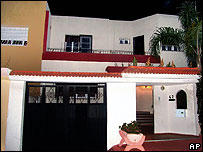
The attack happened on Sunday night in Hay Riad, a residential area of the Moroccan capital, Italian media said.
European Commissioner for External Relations and Neighborhood Policy, Benita Ferrero-Waldner said that according to the first information made available by the Moroccan police, the killing was followed by theft. The couple were Alessandro Missir di Lusignano,(pictured below) an Italian official posted in the Commission delegation in Morocco, and his wife, Ms Arianne Lagasse de Locht.
"We are profoundly shocked by this horrific attack and express our condolences to the four children of the victims, their families and friends," she said.
Ferrero-Waldner said that the Moroccan authorities have expressed their deepest regrets and have ensured the Commission Delegation of their full support and cooperation in the investigation.
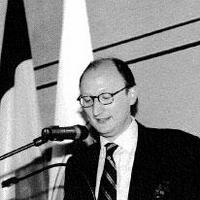
They both worked in the Delegation of the European Union in Rabat.
Security services said that the victims' car and other objects have disappeared.
Tags: Morocco Fes, Maghreb news

The attack happened on Sunday night in Hay Riad, a residential area of the Moroccan capital, Italian media said.
European Commissioner for External Relations and Neighborhood Policy, Benita Ferrero-Waldner said that according to the first information made available by the Moroccan police, the killing was followed by theft. The couple were Alessandro Missir di Lusignano,(pictured below) an Italian official posted in the Commission delegation in Morocco, and his wife, Ms Arianne Lagasse de Locht.
"We are profoundly shocked by this horrific attack and express our condolences to the four children of the victims, their families and friends," she said.
Ferrero-Waldner said that the Moroccan authorities have expressed their deepest regrets and have ensured the Commission Delegation of their full support and cooperation in the investigation.

They both worked in the Delegation of the European Union in Rabat.
Security services said that the victims' car and other objects have disappeared.
Tags: Morocco Fes, Maghreb news
Restoration workers available in Fez

The famous Decapant ladies (paint-strippers) are now available to help reveal the true beauty of your house in Fez. Over the past four months, Fatima and Halima have done a beautiful job taking multiple layers of old paint off all the Riad Zany woodwork, revealing the glorious old cedar that lies beneath.
Paint stripping old timber, often with complex carving, is not an easy job. It requires patience, skill and the willingness to spend large amounts of time with dangerous chemicals.
Now their job at Riad Zany is coming to an end, Fatima and Halima are seeking another project to devote their care and attention to. We have found them excellent employees – reliable, hardworking and dedicated – and we recommend them highly.
If you have some work for them in Fez, email The View From Fez (fes.riad@gmail.com) and we will put you in touch with them.
Other members of our team including two master craftsmen will become available in the next month. So if you are keen to employ a top team, let us know.
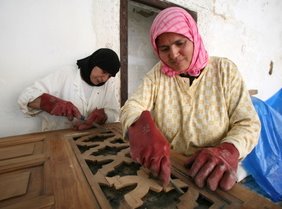
Tags: Morocco Fes, Maghreb news
Sunday, September 17, 2006
The Pope says "sorry".
Hopefully the anger at the Pope's unfortunate remarks will now fade away following his personal apology to the Muslims and Christians who found his remarks unhelpful in the present climate. Sadly there has been violence and reports of church burnings and the death of a nun in Somalia. Those on the Muslim side who react with violence stand condemned by all Moslems.
"While anger over the pope's (Regensburg) remarks is necessary, it shouldn't last long because while he is the head of the Catholic Church in the world, many Europeans are not following (the church) so what he said won't influence them," Head of the Muslim Brotherhood Mohammed Mahdi Akef said in Cairo on Sunday.
"Our relations with Christians should remain good, civilized and cooperative," said the leader of Egypt's largest Islamic political group.
And in an unusual step, the Vatican's press office released translations in English and French of the pope personally saying Sunday he was sorry about the flap. The pope's Sunday remarks, delivered in Italian, typically are not translated by the Vatican.
Benedict said Sunday that he was "deeply sorry" about the angry reaction sparked by his speech about Islam and holy war and said the text did not reflect his personal opinion.
"These (words) were in fact a quotation from a Medieval text which do not in any way express my personal thought," Benedict told pilgrims at his summer palace outside Rome. He noted that the Vatican secretary of state on Saturday had issued a statement trying to explain his words which he delivered Tuesday in a speech during a pilgrimage in his native Germany.
"I hope that this serves to appease hearts and to clarify the true meaning of my address, which in its totality was and is an invitation to frank and sincere dialogue, with great mutual respect."
In Turkey, the pope's "apology" was also seen as insufficient. State Minister Mehmet Aydin said the pope seemed to be saying he was sorry for the outrage but not necessarily the remarks themselves.
"You either have to say this 'I'm sorry' in a proper way or not say it at all," he told reporters in Istanbul. "Are you sorry for saying such a thing or because of its consequences?"
Tags: Morocco Fes, Maghreb news
"While anger over the pope's (Regensburg) remarks is necessary, it shouldn't last long because while he is the head of the Catholic Church in the world, many Europeans are not following (the church) so what he said won't influence them," Head of the Muslim Brotherhood Mohammed Mahdi Akef said in Cairo on Sunday.
"Our relations with Christians should remain good, civilized and cooperative," said the leader of Egypt's largest Islamic political group.
And in an unusual step, the Vatican's press office released translations in English and French of the pope personally saying Sunday he was sorry about the flap. The pope's Sunday remarks, delivered in Italian, typically are not translated by the Vatican.
Benedict said Sunday that he was "deeply sorry" about the angry reaction sparked by his speech about Islam and holy war and said the text did not reflect his personal opinion.
"These (words) were in fact a quotation from a Medieval text which do not in any way express my personal thought," Benedict told pilgrims at his summer palace outside Rome. He noted that the Vatican secretary of state on Saturday had issued a statement trying to explain his words which he delivered Tuesday in a speech during a pilgrimage in his native Germany.
"I hope that this serves to appease hearts and to clarify the true meaning of my address, which in its totality was and is an invitation to frank and sincere dialogue, with great mutual respect."
In Turkey, the pope's "apology" was also seen as insufficient. State Minister Mehmet Aydin said the pope seemed to be saying he was sorry for the outrage but not necessarily the remarks themselves.
"You either have to say this 'I'm sorry' in a proper way or not say it at all," he told reporters in Istanbul. "Are you sorry for saying such a thing or because of its consequences?"
Tags: Morocco Fes, Maghreb news
Moroccan property boom - Irish style.

The Irish Sunday Independant has a strange little story about the property boom in Morocco. Strange? Well, read for yourself:
WHY did teachers find it so difficult when you were honest with them at school? "Would you do that at home O'Keeffe?" they would shout as half a ton of fetching leatherette strap came hurtling towards my poor little lámh.
"Funny you mention it, Sir, but yes and in fact if you don't mind me saying so, you're doing well here - normally at home I'm not half this good".
Those teachers always seemed to imagine that when with our parents we were little cherubs busying ourselves with domestic chores and familial harmony.
Not quite. In our house I normally had Dad in a head lock by 6pm, while my siblings lay in ambush for Mother with a mixture of Patriot and ground-to-air missiles as she came home from work. Kids, eh?
Poor old teachers though. There's nothing wrong with an honestly-held belief, and this week we ask you to turn your attention to the Morocco property market and do the same.
This time however you really can believe what you hear. Apartments at €79,000 in sunny Morocco? You're 'avin a larf', as they might say in Albert Square. But tell me more Property John.
Okay I will. This is Mediterrania Saidia, and it's tipped to be the hottest investment area in the world for investors and lifestyle purchasers alike.
At 50pc cheaper than the Costa del Sol, for example, you can see why. The Mediterrania Saidia is situated on the northern coast of Morocco with easy access from anywhere in Europe, including a 30-minute flight to Melilla from Malaga and a trip from the airport of just over one hour.
Until 1956 Morocco was a French colony (and not a lot of people know that) but now it is the target of some very serious investment and attracting a new breed of investor. King Mohammed's Vision 2010 is a blue-print plan to bring 10m visitors a year by 2010, creating over 600,000 new jobs to the economy.
The government has also created The Plan Azur - six large resorts on the Mediterranean and Atlantic coasts, with today's offering, The Mediterrania Saidia, being the most prestigious.
The difference in prices here is phenomenal, says Regina Burke from Ocean Propertys, with prices starting from as little as €79,000 for a one-bed apartment at 600 sq ft.
Check this out though. There is no capital gain if you hold the property for over 10 years which makes it a serious long-term investment or retirement plan for most people, and also there is no inheritance tax. There is also no rental tax to be paid for the first five years.
Okay, so there's three golf courses, an 800-berth marina, some 17 beach clubs, a 50pc discount on golf membership, and reduced green fees, and 6kms of quality beaches alongside 70pc mortgages availability.
But apart from that, what have the Moroccans ever done for us? Quite a lot, it would seem. Get calling and find out for yourselves.
And for those of you who are interested, here is a map showing Saidia.

Tags: Morocco Fes, Maghreb news
A Gorilla in Fez draws complaints
It might not be in the same league as the Pope's rash insults, but this week's weird but true story is related. From Australia comes this strange tale of another offensive image that has drawn complaints - a gorilla wearing a fez.
Western Australia's Public Transport Authority (PTA) has withdrawn a $7,000 advertising campaign because it received complaints that the advertisements were offensive.
Three people have complained about the posters, which show an oversized gorilla wearing a fez on its head, because the fez is considered to be an Islamic cap.
PTA spokesman David Hynes says the ads have been running since July, but they were pulled this week when the three complaints were received.
He says the PTA has also withdrawn thousands of pamphlets showing the same image.
Mr Hynes says the ads were never meant to offend anyone.
"The decision was made to put the fez on the gorilla and at the time we did not think it was offensive," he said.
"But if somebody felt that it was, for whatever reason, whether it was racial or religious or ethnic, if they felt it was offensive we reacted accordingly and withdrew it immediately."
Mr Hynes says the campaign was due to be pulled by the end of this month anyway.
"Given that it was within a week or so of its life anyway, it was just the easiest thing. We seek not to offend people," he said.
"The complaints were lodged and we looked at them and thought it was a reasonable complaint, albeit I don't necessarily agree with it."
Tags: Morocco Fes, Maghreb news
Western Australia's Public Transport Authority (PTA) has withdrawn a $7,000 advertising campaign because it received complaints that the advertisements were offensive.
Three people have complained about the posters, which show an oversized gorilla wearing a fez on its head, because the fez is considered to be an Islamic cap.
PTA spokesman David Hynes says the ads have been running since July, but they were pulled this week when the three complaints were received.
He says the PTA has also withdrawn thousands of pamphlets showing the same image.
Mr Hynes says the ads were never meant to offend anyone.
"The decision was made to put the fez on the gorilla and at the time we did not think it was offensive," he said.
"But if somebody felt that it was, for whatever reason, whether it was racial or religious or ethnic, if they felt it was offensive we reacted accordingly and withdrew it immediately."
Mr Hynes says the campaign was due to be pulled by the end of this month anyway.
"Given that it was within a week or so of its life anyway, it was just the easiest thing. We seek not to offend people," he said.
"The complaints were lodged and we looked at them and thought it was a reasonable complaint, albeit I don't necessarily agree with it."
Tags: Morocco Fes, Maghreb news
Morocco protests Pope's insulting comments.

Morocco has recalled its ambassador to the Vatican after the comments made on Tuesday by Pope Benedict XVI on Islam and Prophet Mohammad (PBUH).
HM King Mohammed VI has also sent a written message to Pope Benedict XVI in protest of the latter's offending statements about Islam.
On September 12 in the university of Regensburg, Germany, Pope Benedict XVI quoted a 14th-century Byzantine Emperor who called Islam "evil and inhuman," and accused Prophet Muhammad of spreading the faith "by the sword," thus sparking wrath among Muslims around the world.
According to a press release issued on Saturday by the Moroccan Ministry of Foreign Affairs, the Moroccan ambassador Ali Achour has been recalled for consultation, starting from Sept. 17, by order of HM King Mohammed VI.

Achour was appointed as ambassador to the Holy See last January by HM. King Mohammed VI.
Mohamed El Yazghi, the leader of the Socialist Union of Popular Forces, the main party in Morocco's governing coalition, welcomed the move.
"It is a totally normal reaction from Morocco which is putting on record its disapproval of the comments of Benedict XVI, especially given that previous popes and the representatives of Islam had entered into a relationship of debate, reflection and getting to know each other," he said.
Abdelilah Benkirane, a leader of the Islamist Justice and Development party (PJD), thanked the king, saying he had made a "wise decision".
"We ask God to thank and glorify him", he said, urging the pope to make a public apology.
A university researcher specialising in Islam, Mohamed Ayadi, told the media that the king's decision was an attempt to preempt any popular protests.
He is "taking the lead to avoid any street protests... In several Muslim countries, it was street that led protests against the publication of caricatures of Prophet Mohammed in Europe," Ayadi said.
In other developments, the Council on American-Islamic Relations (CAIR) has called for developing dialogue between Muslims and Catholics around the world after the controversy triggered by the insulting comments made by Pope Benedict XVI about Islam and Prophet Mohammad (PBUH).
"The proper response to the Pope's inaccurate and divisive remarks is for Muslims and Catholics worldwide to increase dialogue and outreach efforts aimed at building better relations between Christianity and Islam,” the Council said in a press release.
The council also said it will seek a meeting with the Vatican representative in Washington D.C to discuss the issue.
The CAIR said that this incident can be an opportunity for Christians around the world to know more about Islam, Prophet Mohammad, and the Islamic concept of Jihad.
"Jihad is a central and broad Islamic concept that includes struggle against evil inclinations within oneself, struggle to improve the quality of life in society, struggle in the battlefield for self-defense (e.g., - having a standing army for national defence), or fighting against tyranny or oppression,” the CAIR explained.
The Council also called on Muslims to “maintain good relations with the people of other faiths, and to engage in constructive dialogue.”
Strong reactions against the Pope's remarked sparked off when he quoted on Tuesday, during his visit to Germany, a 14th century Byzantine Christian Emperor as saying “Show me just what Muhammad brought that was new, and there you will find things only evil and inhuman, such as his command to spread by the sword the faith he preached.”
Many religious leaders and organisations condemned the comments. Some voices warned that this could lead to more misunderstanding and violence around the world. Reactions to the speech have come from such leaders as Pakistani President Pervez Musharraf, who said efforts to link Islam and terrorism should be clearly opposed.
Street protests have been held in Pakistan, India, Turkey and Gaza.
In the West Bank city of Nablus, two churches were firebombed on Saturday in attacks claimed by a group which said it was protesting against the Pope's remarks.
Earlier today the head of the Roman Catholic Church voiced deep regret at the Islamic world's outraged reaction to a speech he gave in Germany this week but stopped short of retracting his remarks, arguing that they had been misinterpreted.
Reading the statement, new Vatican Secretary of State Cardinal Tarcisio Bertone said the Pope's position on Islam was in line with Vatican teaching that the Church "esteems Muslims, who adore the only God".
"The Holy Father is very sorry that some passages of his speech may have sounded offensive to the sensibilities of Muslim believers," the statement said.
But Egypt's Muslim Brotherhood said the statement did not go far enough and called on the pontiff to apologise in person.
"The Vatican Secretary of State says that the Pope is sorry because his statements had been badly interpreted, but there is no bad interpretation," said Abdel Moneim Abul Futuh, a senior official from the opposition party.
Tags: Morocco Fes, Maghreb news
Friday, September 15, 2006
New flights and high speed train for Morocco
Jet4You launches new Morocco-Belgium routes
The low-cost airline "Jet4You" will service three new weekly flights linking the Belgian airports of Charleroi and Liege to Casablanca as of November 1. The company will also launch Casablanca-Paris route on Oct. 29t. According to a press release from the company, these flights will be serviced on a 173-seat 737-400 Boeing.
The initiative is part of the company's strategy to cover other European countries in a bid to reach 1.5 million passengers by 2010. The company, which kicked off its activities in Morocco on February 26, has a euro 5.5Mn capital owned at 40% by tourism word leader and 5th European carrier TIU group, and at 60% by Moroccan shareholders.
The British low cost airliner, Easyjet, has also announced the opening of a new route between Madrid and Casablanca starting February 2007.
The British company said this new route is part of a project to launch six new lines from the Spanish capital to other cities in Spain, France, Italy and Morocco.
Morocco plans Arab world’s first high-speed train
Work on the Arab world’s first high-speed train -- stretching from the Mediterranean to the door of the Sahara desert -- could begin next year. The trains would travel at up to 300 kilometres (186 miles) per hour, slashing times from Tangier in the north via Marrakesh to Agadir in the south, and from Casablanca on the Atlantic to Oujda on the Algerian border.
“Marrakesh to Tangier in two and a half hours -- it’s as if the country’s shrinking,” rail operator ONCF’s managing director Mohamed Rabie Khlie said in an interview.
“A high-speed rail network will put us in the rail industry’s big league.”
If the plans are approved, the 1,500 kilometres of track may take until 2030 to complete at a cost of around 25 billion dirhams ($2.87 billion), Khlie said.
Improving transport links from the centre of the kingdom to long-neglected outlying regions is an important part of the government’s attempt to stimulate the economy and reduce unemployment and poverty.
A better rail network would also relieve congestion on Morocco’s roads, where around 10 people die every day in accidents.
Once financing for the new lines is sealed, engineering work could begin in the second half of 2007, Khlie said.
Journeys from Casablanca to Marrakesh could be cut to 1 hour and 20 minutes from over three hours, and from the capital Rabat to Tangier to 1 hour and 30 minutes from 4 hours and 30 minutes.
And Khlie said plans mooted years ago for a tunnel from Europe to Africa across the strait of Gibraltar were still on course, meaning trains may one day travel direct from Madrid to Marrakesh.
“A Moroccan-Spanish committee is working very hard on this issue and it’s going very well,” he said. “We feel quite a clear willingness on the Spanish side to push things forward.”
According to media reports earlier this year, the United Arab Emirates is studying the feasibility of a high-speed rail line between its airports in Abu Dhabi and Dubai.
But Khlie said ONCF was the only train company in the Arab world with the financial health and technical capabilities needed to launch a high-speed rail project.
After years of restructuring with the help of loans from the World Bank, European Investment Bank and foreign governments, ONCF began turning a consolidated profit from 2004, giving it the financial muscle to embark on a broad expansion.
It plans to invest 15.5 billion dirhams in the 2005-09 period, as much as was spent in the previous 25 years, to expand and improve a cumbersome infrastructure, parts of which have changed little since the days of the French protectorate.
ONCF will acquire the status of a company next year, with a 50-year concession to operate the existing national network.
Under plans to liberalise the rail sector, private companies could be contracted to build and operate future rail lines that would link up with ONCF’s network, Khlie said.
But he played down the idea that the government may split ONCF’s infrastructure and operations activities, an option chosen by some European rail firms, or even privatise it.
“Nothing stops ONCF being brought to the stock market as long as the state keeps overall control,” he said. “The priority today is not any privatisation but to develop the network.”
Tags: Morocco Fes, Maghreb news
The low-cost airline "Jet4You" will service three new weekly flights linking the Belgian airports of Charleroi and Liege to Casablanca as of November 1. The company will also launch Casablanca-Paris route on Oct. 29t. According to a press release from the company, these flights will be serviced on a 173-seat 737-400 Boeing.
The initiative is part of the company's strategy to cover other European countries in a bid to reach 1.5 million passengers by 2010. The company, which kicked off its activities in Morocco on February 26, has a euro 5.5Mn capital owned at 40% by tourism word leader and 5th European carrier TIU group, and at 60% by Moroccan shareholders.
The British low cost airliner, Easyjet, has also announced the opening of a new route between Madrid and Casablanca starting February 2007.
The British company said this new route is part of a project to launch six new lines from the Spanish capital to other cities in Spain, France, Italy and Morocco.
Morocco plans Arab world’s first high-speed train
Work on the Arab world’s first high-speed train -- stretching from the Mediterranean to the door of the Sahara desert -- could begin next year. The trains would travel at up to 300 kilometres (186 miles) per hour, slashing times from Tangier in the north via Marrakesh to Agadir in the south, and from Casablanca on the Atlantic to Oujda on the Algerian border.
“Marrakesh to Tangier in two and a half hours -- it’s as if the country’s shrinking,” rail operator ONCF’s managing director Mohamed Rabie Khlie said in an interview.
“A high-speed rail network will put us in the rail industry’s big league.”
If the plans are approved, the 1,500 kilometres of track may take until 2030 to complete at a cost of around 25 billion dirhams ($2.87 billion), Khlie said.
Improving transport links from the centre of the kingdom to long-neglected outlying regions is an important part of the government’s attempt to stimulate the economy and reduce unemployment and poverty.
A better rail network would also relieve congestion on Morocco’s roads, where around 10 people die every day in accidents.
Once financing for the new lines is sealed, engineering work could begin in the second half of 2007, Khlie said.
Journeys from Casablanca to Marrakesh could be cut to 1 hour and 20 minutes from over three hours, and from the capital Rabat to Tangier to 1 hour and 30 minutes from 4 hours and 30 minutes.
And Khlie said plans mooted years ago for a tunnel from Europe to Africa across the strait of Gibraltar were still on course, meaning trains may one day travel direct from Madrid to Marrakesh.
“A Moroccan-Spanish committee is working very hard on this issue and it’s going very well,” he said. “We feel quite a clear willingness on the Spanish side to push things forward.”
According to media reports earlier this year, the United Arab Emirates is studying the feasibility of a high-speed rail line between its airports in Abu Dhabi and Dubai.
But Khlie said ONCF was the only train company in the Arab world with the financial health and technical capabilities needed to launch a high-speed rail project.
After years of restructuring with the help of loans from the World Bank, European Investment Bank and foreign governments, ONCF began turning a consolidated profit from 2004, giving it the financial muscle to embark on a broad expansion.
It plans to invest 15.5 billion dirhams in the 2005-09 period, as much as was spent in the previous 25 years, to expand and improve a cumbersome infrastructure, parts of which have changed little since the days of the French protectorate.
ONCF will acquire the status of a company next year, with a 50-year concession to operate the existing national network.
Under plans to liberalise the rail sector, private companies could be contracted to build and operate future rail lines that would link up with ONCF’s network, Khlie said.
But he played down the idea that the government may split ONCF’s infrastructure and operations activities, an option chosen by some European rail firms, or even privatise it.
“Nothing stops ONCF being brought to the stock market as long as the state keeps overall control,” he said. “The priority today is not any privatisation but to develop the network.”
Tags: Morocco Fes, Maghreb news
Thursday, September 14, 2006
Reversing Morocco's brain drain.
Aljazeera. net is running an interesting story about ex-pats being lured back to Morocco. A link to the original article is at the end.
Morocco wants to lure back its citizens living abroad to reverse a brain drain and reduce poverty, but many say they have worked hard to carve out a life in Europe and to return would be a leap into the unknown.
The three million Moroccans living abroad represent around 10 per cent of the country's resident population and their money transfers are its biggest foreign currency source after tourism.
An official report early this year said Morocco must create 400,000 jobs annually over the next 10 years to prevent mass unemployment, especially among graduates.
The government is turning to expatriates to help build the businesses that will create those jobs.
But many of those who fled unemployment in Morocco now have good jobs, higher living standards and foreign-educated children.
Even those struggling in the European job market who feel discriminated against because of their origins say a return to Morocco holds risks and uncertain rewards.
"It's already hard enough getting by in France," said Jaouad Ouargo, a 21-year-old auto engineer from Paris, as he queued in the northern port of Tangier for the ferry to Spain. "If I try something new here, it'll be harder."
The government is trying to boost sluggish economic growth by enacting investment-friendly reforms and making the banking sector more robust to cut lending rates.
High-value industrial exports are being nurtured with free trade deals and heavy transport infrastructure investment to reduce the economy's reliance on drought-prone agricultural.
While foreign investment in Morocco is booming, spurred on by large-scale tourism and property developments, expatriates appear loath to sink their money into smaller, job-creating enterprises.
Some $2.58 billion were repatriated in the first half of 2006, 24 per cent more than a year earlier, but most went to support families and build second homes.
Many Moroccans living abroad say they are put off starting a business by complex administrative procedures, the risk of long delays in getting the right documents, and a perception that you need powerful contacts in business and government.
"This reticence is linked to a totally outdated image," said Jelloul Samsseme, head of Morocco's northern regional investment centre, saying anyone wanting to start up a business could have all the documents they need from one location within 48 hours.
The complete article is here on Aljazeera
Tags: Morocco Fes, Maghreb news
Morocco wants to lure back its citizens living abroad to reverse a brain drain and reduce poverty, but many say they have worked hard to carve out a life in Europe and to return would be a leap into the unknown.
The three million Moroccans living abroad represent around 10 per cent of the country's resident population and their money transfers are its biggest foreign currency source after tourism.
An official report early this year said Morocco must create 400,000 jobs annually over the next 10 years to prevent mass unemployment, especially among graduates.
The government is turning to expatriates to help build the businesses that will create those jobs.
But many of those who fled unemployment in Morocco now have good jobs, higher living standards and foreign-educated children.
Even those struggling in the European job market who feel discriminated against because of their origins say a return to Morocco holds risks and uncertain rewards.
"It's already hard enough getting by in France," said Jaouad Ouargo, a 21-year-old auto engineer from Paris, as he queued in the northern port of Tangier for the ferry to Spain. "If I try something new here, it'll be harder."
The government is trying to boost sluggish economic growth by enacting investment-friendly reforms and making the banking sector more robust to cut lending rates.
High-value industrial exports are being nurtured with free trade deals and heavy transport infrastructure investment to reduce the economy's reliance on drought-prone agricultural.
While foreign investment in Morocco is booming, spurred on by large-scale tourism and property developments, expatriates appear loath to sink their money into smaller, job-creating enterprises.
Some $2.58 billion were repatriated in the first half of 2006, 24 per cent more than a year earlier, but most went to support families and build second homes.
Many Moroccans living abroad say they are put off starting a business by complex administrative procedures, the risk of long delays in getting the right documents, and a perception that you need powerful contacts in business and government.
"This reticence is linked to a totally outdated image," said Jelloul Samsseme, head of Morocco's northern regional investment centre, saying anyone wanting to start up a business could have all the documents they need from one location within 48 hours.
The complete article is here on Aljazeera
Tags: Morocco Fes, Maghreb news
New novel features Fez!
As the observant reader will have noticed, our editor in chief, Samir (Sandy McCutcheon), is away in Australia. This Saturday he launches his latest novel, The Cobbler's Apprentice. Readers of The View from Fez can purchase a first edition copy by clicking on the link in the side bar or using this link - Bookshop.

The novel will be of interest to people who are fascinated by the old medina of Fez as part of the action takes place here. As the Australian newspaper article recently said: "Author Sandy McCutcheon is one of a few mass market Australian novelists to have tackled terrorism. His recent thriller Black Widow looks at the aftermath of the 2004 Beslan siege, while his latest, The Cobbler's Apprentice, published this month, follows a terror suspect who leaves Guantanamo Bay and becomes an agent of mass destruction."
From the book's jacket:
The Cobbler's Apprentice
Sandy McCutcheon
When Samir Al-Hassani does the impossible, and escapes from Guantanamo Bay, a chain of events is set off that is to lead to terror and bloodshed around the world. Sami, a young Palestinian who had been caught in Iraq, thinks he has been helped by fellow jihadis, but the CIA and Mossad are pulling his strings. Or are they?
Sami is being set up, in more ways than one. He has embarked on a journey into the bewildering heartland of terrorism and counter-terrorism, where betrayal and deceit go hand-in-hand with honour and duty. While Washington engages in murky power politics, Sami’s body and soul are sorely tested in the back streets of Morocco. When he emerges with a master and a mission, the stage is set for a hair-raising development: Sami is about to become a biological weapon of mass destruction, targeted at the very people who released him.
The Cobbler’s Apprentice is an international thriller that launches the reader into an all-too-believable world of tomorrow’s headlines.
Tags: Morocco Fes, Maghreb news

The novel will be of interest to people who are fascinated by the old medina of Fez as part of the action takes place here. As the Australian newspaper article recently said: "Author Sandy McCutcheon is one of a few mass market Australian novelists to have tackled terrorism. His recent thriller Black Widow looks at the aftermath of the 2004 Beslan siege, while his latest, The Cobbler's Apprentice, published this month, follows a terror suspect who leaves Guantanamo Bay and becomes an agent of mass destruction."
From the book's jacket:
The Cobbler's Apprentice
Sandy McCutcheon
When Samir Al-Hassani does the impossible, and escapes from Guantanamo Bay, a chain of events is set off that is to lead to terror and bloodshed around the world. Sami, a young Palestinian who had been caught in Iraq, thinks he has been helped by fellow jihadis, but the CIA and Mossad are pulling his strings. Or are they?
Sami is being set up, in more ways than one. He has embarked on a journey into the bewildering heartland of terrorism and counter-terrorism, where betrayal and deceit go hand-in-hand with honour and duty. While Washington engages in murky power politics, Sami’s body and soul are sorely tested in the back streets of Morocco. When he emerges with a master and a mission, the stage is set for a hair-raising development: Sami is about to become a biological weapon of mass destruction, targeted at the very people who released him.
The Cobbler’s Apprentice is an international thriller that launches the reader into an all-too-believable world of tomorrow’s headlines.
Tags: Morocco Fes, Maghreb news
Travel Writing about Morocco - Part 4.
From time to time Samir has posted some interesting critiques about travel writing on Morocco. So while he is away launching his new book in Australia, here is a story from a Canadian, Adam Smith. The article is short but interesting as it is a look at a specific part of Morocco. Here is an excerpt followed by a link to the full article:
I was travelling alone when I rolled into Chefchaoen by collective taxi—collective early ’70s Mercedes actually—a make not unlike most taxis that bounce between these rocky localities. Coming from busy, bustling Tangiers, just under two hours away, I was ready for a less hectic scene and a place to get outside and move, to see the land.
By chance, I met a Spanish woman and her boyfriend, who was from Hinton area. The pair informed me that they would be hiking to a long waterfall south of town and invited me to join them. Accompanying us were two American hippies and a Danish woman. After bartering for 20 minutes with an aggressive yet good-natured hoard of taxi drivers, we got in a cab and started for the trailhead.
At the base of the hike, a fast moving chute emptied into a wide, slow-moving river, where some families where picnicking on its banks. The winding ascent quickly wound up the mountain, cutting through arching bush and coiling around massive boulders. We reached a narrow, decrepit foot bridge that took us over a small waterfall and a deep pool where a some Berber children were playing. They became a part of our entourage, circling about us, quick, half-naked and barefoot, and cheerfully pointing ahead and shouting in Arabic.
Our group had begun to grow. A few moments later, I looked behind to see a balding middle-aged man climbing towards us at a fair pace—our taxi driver. He was sweating profusely, drenching his dark tweed pants and dress shirt, laughing and gesturing with his hands. When the children dashed by him, he would lift his hand and tap them each on the head. We hiked together for another hour.
As we approached the falls we could hear the sound of the water crashing and the air grew misty and cool. The size of the falls was unimpressive but the tranquil beauty of the setting was surreal. How the Great Flowers were blooming!
We paid the kids off with some watermelon, and after a swim and some lunch, we started on the roundabout path back to the base of the mountain. I kept my eyes peeled as the cab driver explained to me that these fields are home to thousands of cannabis plantations (as I would encounter first hand days later). As we descended, he pointed out patches of light, bright green, and I told him of Canada’s true best export. The hike back was much lighter as we descended into a long hooking valley that would mildly bring us back to our starting point.
In the valley we passed the home of a real shepherd and his flock. His home was handmade from mortar and stone, probably from the creek running alongside his home. His flock adorned his porch and decorated the rest of the yard alongside large boulders that appeared to have fallen straight from the mountain high above. The goats watched us pass with comic indifference.
Read the full article here: WHEN IN MOROCCO, DON'T EXPECT A NAKED LUNCH
Tags: Morocco Fes, Maghreb news
Subscribe to:
Comments (Atom)

